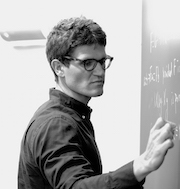

I am a professor of philosophy at UT Austin. Until 2022, I was an assistant professor, and then a professor of philosophy at Princeton. You can view my CV here.
I have broad interests in contemporary philosophy and in the history of philosophy. A full list of my published and working papers can be found below.
Much of my work has centered on propositional attitudes like belief, desire, hope, and fear. I have worked on the nature of these attitudes and their contents (with papers on the consistency of structured propositions, and on the consequences of rejecting Leibniz's Law). I have also worked on the semantics of propositional attitude reports, with particular attention to logical omniscience, Frege's puzzle, and the connection between them (I've developed versions of Russellianism, Fregeanism, and a third option in between). I recently participated in a podcast which introduces some of these ideas.
My work on these topics has been motivated by questions about the nature of human rationality and the explanation of our actions, though I have yet to write a paper that makes these connections explicit. (A paper on models of awareness in economic theory makes something of a start.) I came to questions about the metaphysics of content after working on the rationality of group decisions, and in particular on whether common knowledge is required for rational coordination in groups. I developed a new argument that people never have common knowledge, showed that common knowledge is not required for rational coordination, and described how implausibly strong assumptions about common knowledge are key to the famous agreement theorem. While working on this project, I became dissatisfied with the theory of content inscribed in standard formal models of decision-making, and hoped to find a better one.
Recently, I have been working on questions about rationality from a different perspective, with a pair of papers on incomplete preferences in decision theory: one focusing on philosophical questions about the rationality of such preferences; the other focusing on relevant mathematical results.
Other current projects include: a paper on trying in the philosophy of action (with Ben Holguín), a paper on whether modern LLMs can produce meaningful text (with Kyle Mahowald), and a new interpretation of the moral metaphysics of the great Ming dynasty philosopher Wang Yangming (1472-1529), in particular his slogan "mind is principle'' (心即理). This last paper grows out of a longstanding interest in Wang's philosophy, including papers on his moral psychology, moral epistemology, and more broadly, on his doctrine of the "unity of knowledge and action".
In the past, I have also worked on interpersonal well-being comparisons (and a related version of Arrow's theorem), on non-classical and modal set theories, and on a notion of ontological dependence Aristotle develops in his discussions of blood and of time. In another life, I wrote a paper on DNA computing (and contributed to a second).
In January 2024, together with Johan Gustafsson, I organized a conference on completeness and incompleteness of preference and value. The website for this event is here.
In March 2022, together with P. J. Ivanhoe and Snow Xueyin Zhang, I organized an international conference on Wang Yangming, Wang Yangming and Ming Thought. You can view photos from the event on the "Highlights" page. A report on the conference, which also tells the story of how I started working on Wang Yangming, was published in 国际儒学.
In 2018, 2019 and 2020, I organized the Princeton Talks in Epistemology and Metaphysics (TEAM) conference series. You can find the programs for these three conferences here.
Work in Progress:
Unpublished Short Pieces:
Publications:
Conference Proceedings:
Handbook Article:
Dissertation Chapters, not currently in progress:
Older Papers: